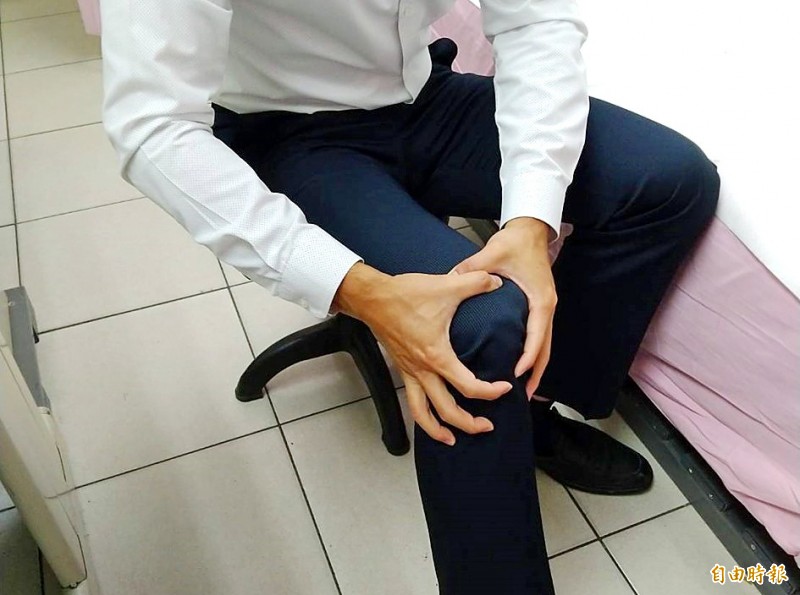《TAIPEI TIMES》 Doctor urges adequate protein intake

A man cups his hands around his kneecap to demonstrate calf diameter that might indicate the degenerative muscle loss condition sarcopenia in Taipei on Sept. 26. Photo: Tsai Chang-sheng, Taipei Times
DEFICIENCY: Many elderly people stop eating meat and eggs, believing that they should have a simpler diet, but this leads to a nutritional imbalance, Peng Li-ning said
By Lo Chi and William Hetherington / Staff reporter, with staff writer
People should ensure they consume enough protein, among other nutrients, a doctor has said, drawing attention to sarcopenia, which affects up to 10 percent of adult Taiwanese.
There are an estimated 300,000 people in Taiwan with sarcopenia — the loss of skeletal muscle mass and strength as a result of aging — but only 20 percent of them are aware of the condition, Taipei Veterans General Hospital gerontologist Peng Li-ning (彭莉甯) said.
Many elderly people eat simple diets that are low in protein, and if they also lack a regular exercise regimen, they might be at risk of serious loss of skeletal muscle mass, she said.
Sarcopenia leads to loss of physical strength and a decline in metabolism, and people with the condition quickly become tired during physical activity and are more at risk of falling, she added.
However, if they do not move about and exercise the condition would worsen, creating a vicious circle, Peng said.
Over time, the condition would take a toll on patients’ mood, appetite and mental health, she said.
After turning 40, a person’s physical health and bodily functions begin to noticeably degenerate, and they would lose 3 to 8 percent of their muscle mass within the next 10 years, Peng said.
Between 50 and 80 years of age they would lose 30 to 40 percent of their muscle mass, she added.
Elderly women in particular might notice their grip strength decreasing ever year, she said, adding that dietary changes could help offset this.
“About 90 percent of Taiwanese between 45 and 65 years old do not consume enough dairy products, and their consumption of fruit and vegetables is less than 20 percent of what is recommended,” Peng said.
Many elderly people believe that they should have a simpler diet as they get older, and many stop eating meat and eggs entirely, she said, adding that this leads to a nutritional imbalance, exacerbating loss of muscle mass.
To mitigate muscle degeneration, people should eat at least 1g to 1.2g of protein per kilogram of body weight per day, Peng said, adding that meat, shrimp, tofu, milk, soy milk and eggs are all good sources of protein.
However, exercise is needed to advance the process of protein synthesis, she said.
“Simply consuming nutrients alone is useless, you must exercise,” she added.
Citing a study by Japanese researchers published in academic journal Geriatrics and Gerontology International in 2015, Peng said the thickness of the calves could be used to measure people’s risk of developing sarcopenia.
“If you can wrap your hands around the thickest part of your calf, then it is too thin,” she said.
People with excessively thin calves are at six times greater risk of developing sarcopenia, and twice as likely to die from the condition, she said, citing the study.
In people over 65, a calf diameter of less than 34cm for men and less than 33cm for women might indicate the onset of sarcopenia, she said.
新聞來源:TAIPEI TIMES


















